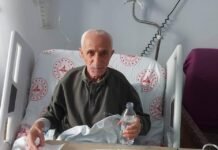Turkish authorities have denied the appeal of an 80-year-old Kurdish woman, arrested for links to the outlawed Kurdistan Workers’ Party (PKK), to be put under house arrest, the Mezopotamya news agency (MA) reported.
Makbule Özer requested to be released from prison and put under house arrest, saying she was not fit to stay in prison and that prison conditions negatively affected her already poor health. However, her motion was denied by the court, and Özer was sent to the hospital for a health report.
Speaking to her family on the telephone, Özer said she could barely walk and suffered from multiple afflictions such as diabetes and high blood pressure. “My cellmates are taking care of me as much as they can, but I am constantly in the prison infirmary,” she said. “I can’t stay in prison long-term this way. I could die here!”
Özer’s lawyer, Dilan Kunt Ayan, said the court ordered a report from the Turkish Council of Forensic Medicine (ATK) to determine if Özer was fit to remain in prison. “However, we are concerned about ATK as they have been issuing controversial reports recently,” she said. “The court’s denial of my client’s release is completely unlawful. This woman can barely walk. We will appeal to the Constitutional Court.”
Doubts over the independence and credibility of the ATK, an institution that assesses the condition of sick inmates to decide if they are fit to remain in prison and is under the jurisdiction of the Ministry of Justice, have grown in recent years as more and more critically ill prisoners have died behind bars.
Makbule Özer and her husband Hadi Özer, 78, were sentenced to two years, six months each in prison for allegedly aiding and abetting a terrorist organization. The elderly couple’s arrest sparked public outrage, and several opposition politicians demanded their immediate release.
The Özer couple were first detained along with five other family members on July 24, 2018 after a police raid on their home.
Özer’s daughter said on the night of the raid a woman with a broken bone came to their home and her mother tried to help with traditional medicine. “Our house was raided just as my mother was applying cream to the fracture,” she said.
According to the most recent statistics published by the Human Rights Foundation (İHD), the number of sick prisoners is in the thousands, more than 600 of whom are critically ill. Although most of the seriously ill patients have forensic and medical reports deeming them unfit to remain in prison, they are not released. Authorities refuse to free them on the grounds that they pose a potential danger to society.
A number of critically ill prisoners passed away in 2020 because they were not released in time to receive proper medical treatment. Three critically sick inmates died in the first three months of this year in prison















